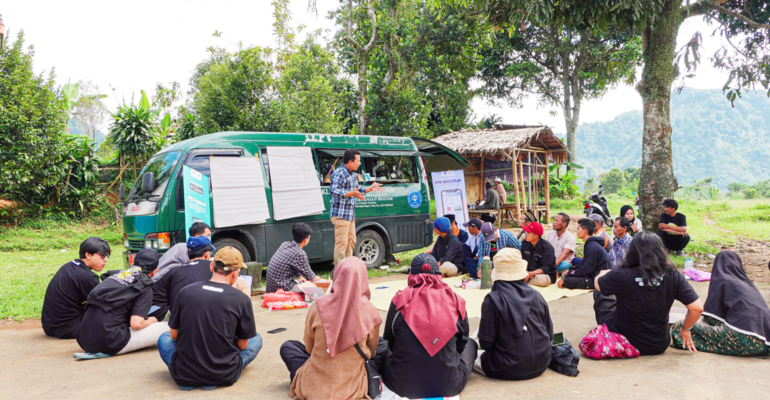IPB’s Plant Clinic Serves as ‘Field Laboratory’, Farmers in Kiarasari Can Consult Agricultural Problems

Farmers and Fishermen Center (TNC) IPB University collaborated with Gugah Nurani Indonesia (GNI) in organising an agricultural consultation activity called ‘Field Laboratory’. The event was successfully held on 26/11 at SDN Cipendeuy Field, Kiarasari Village, Sukajaya District, Bogor Regency.
Muhammad Rusdini, a local champion farmer in Kiarasari Village, expressed the villagers’ enthusiasm for agricultural regeneration in his speech. “Permaculture of nonpesticide trubuk and horticulture has also been carried out with the hope of collaborating with nonpesticide treatments. Assistance is not only from GNI, but can also involve other sectors, such as TNC IPB University,” said Rusdini.
The activity involves IPB University’s Integrated Plant Clinic car which is equipped with laboratory equipment to conduct plant testing efficiently.
Bonjok Istiaji, SP, MSi, lecturer at the Department of Plant Protection, Faculty of Agriculture, IPB University, gave an introduction and acted as an expert from TNC IPB University at the consultation session. He explained that the plant clinic (Klintan) functions as a mobile health centre for plants.
“Farmers are invited to bring diseased plants during the plant clinic event so that they can be better identified. This is an opportunity for farmers to get solutions and recommendations directly from agricultural experts,” Bonjok said.
A total of 42 farmers enthusiastically brought their crops, including shallots, long beans, chillies and cucumber. The farmers had the opportunity to consult on pests and diseases affecting their crops.
This activity is expected to be a concrete solution to crop problems for farmers in Kiarasari Village. Initiatives like this not only provide practical answers, but also build networks between farmers and agricultural experts and create synergies that are beneficial for the development of sustainable agriculture in the region.
“This activity can share knowledge and experience for the first step forward, so that farmers have room to move and are given the opportunity to become pioneers and agents of change from their respective areas in the agricultural sector,” said Anton Setiawan as GNI’s Community Development Programme Manager. (NWE/Rz) (IAAS/RUM)



